Arizona’s Hit and Run Laws – Leaving the Scene of an Accident
ARS 28-661, ARS 28-662, ARS 28-663, ARS 28-664, ARS 28-665, ARS 28-666
Under Arizona’s vehicle accident laws, drivers involved in an accident have a duty to remain at the scene, exchange information, and display a driver’s license upon request. If the accident involves injury, drivers must render reasonable assistance, help coordinate medical transportation, and give notice to law enforcement.
Contact Tobin Law Office
Affordable, Local, Top Rated Criminal Defense Lawyer
Arizona’s Top Rated Hit And Run Lawyer
In the case of hitting an unattended parked vehicle, drivers must immediately stop and try to locate the owner. If the owner cannot be found, drivers must leave a note that provides the name and address of the driver and vehicle owner. In cases of hitting roadway property—such as signs, mailboxes, and fences—drivers must make reasonable efforts to notify the owner and provide their name, address and vehicle registration number.
Drivers who fail to comply with these duties may be prosecuted. When an accident involves injury, drivers face felony prosecution. When an accident doesn’t involve injury, drivers face misdemeanor prosecution.





Types of Criminal Charges In An Arizona Hit & Run Case
Highly Experienced Hit And Run Attorney Near Arizona
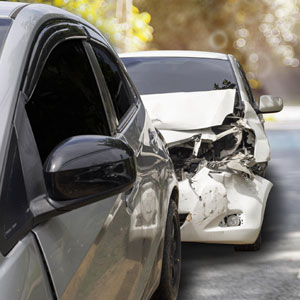
Misdemeanor Hit and Run – ARS 28-662 – Leaving the Scene of an Accident that Only Involves Vehicle Damage.
If an Arizona accident only results in vehicle damage, with no injuries, drivers must immediately stop and remain at the scene, or return as soon as possible. Drivers must then exchange requisite information. A violation of this statute is a class 2 misdemeanor.
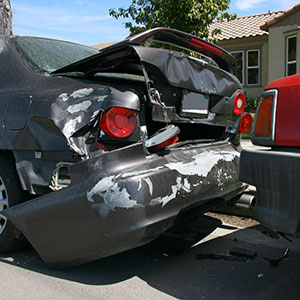
Misdemeanor Hit and Run – ARS 28-664 – Leaving the Scene after Hitting a Parked Vehicle.
Drivers, who hit a parked car, must stop and do either of the following: (1) locate the owner of the parked car to provide their name and address; or, (2) leave a conspicuous note that provides their name and address. If the driver doesn’t own the vehicle, the driver must also provide the owner’s name and address. A violation of this statute is a class 3 misdemeanor.
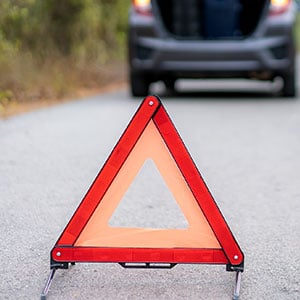
Misdemeanor Hit and Run – ARS 28–665 – Leaving the Scene of an Accident that Results in Damage to Non-Vehicle Property.
Common examples of this include hitting a sign, fence, or mailbox. After striking property that’s on or adjacent to a roadway, drivers must take reasonable steps to locate and notify the owner and provide their name, address and vehicle registration number. If the owner asks, drivers must also display their license. A violation of this statute is a class 3 misdemeanor.

Refusal or Failure to Exchange Information at an Accident Scene – ARS 28-663
Drivers who refuse or fail to exchange information after an accident can be charged with a class 3 misdemeanor. Drivers must provide their name and address, their vehicle registration number, and display their license upon request.
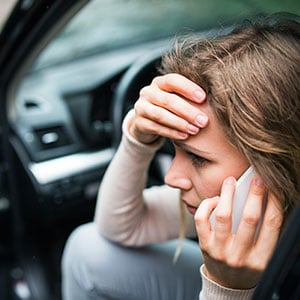
Felony Hit and Run – ARS 28-661 – Leaving the Scene of an Accident that Results in Injury or Death.
Drivers involved in an accident that results in injury or death must remain at the scene or return as soon as possible. Drivers then must provide their name, address, vehicle registration number, and license. In addition, because there’s an injury, the driver must render reasonable assistance, help coordinate medical transportation, and notify law enforcement. The felony hit and run classification is dictated by the nature of the accident. If the driver causes an accident that results in serious injury or death, the driver can be charged with a class 2 felony. If the driver didn’t cause the accident, but was still involved in an accident involving serious injury or death, the driver can be charged with a class 3 felony. If the accident involves only non-serious injury, it should only be charged as a class 5 felony. If a driver remains, but fails to offer reasonable assistance to an injured person, the driver can still be charged with a class 6 felony under ARS 28-663(A)(3).
Common Defenses to Hit and Run / Leaving the Scene of an Accident
Arizona’s Most Popular Legal Hit And Run Defense Strategies
Lack of Knowledge
The prosecutor must prove, beyond a reasonable doubt, that you knew you were involved in an accident. State v. Lee (1939) Ariz. Whether a driver had knowledge of a collision can be proved by circumstantial evidence; but still, the prosecutor must show that the driver must have known of the collision. Id. “Common sense and justice alike revolt at the idea that a man may be held criminally responsible for something which he does not even know he has done.” Id.
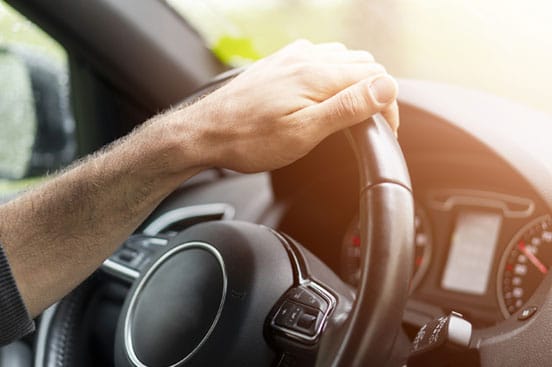
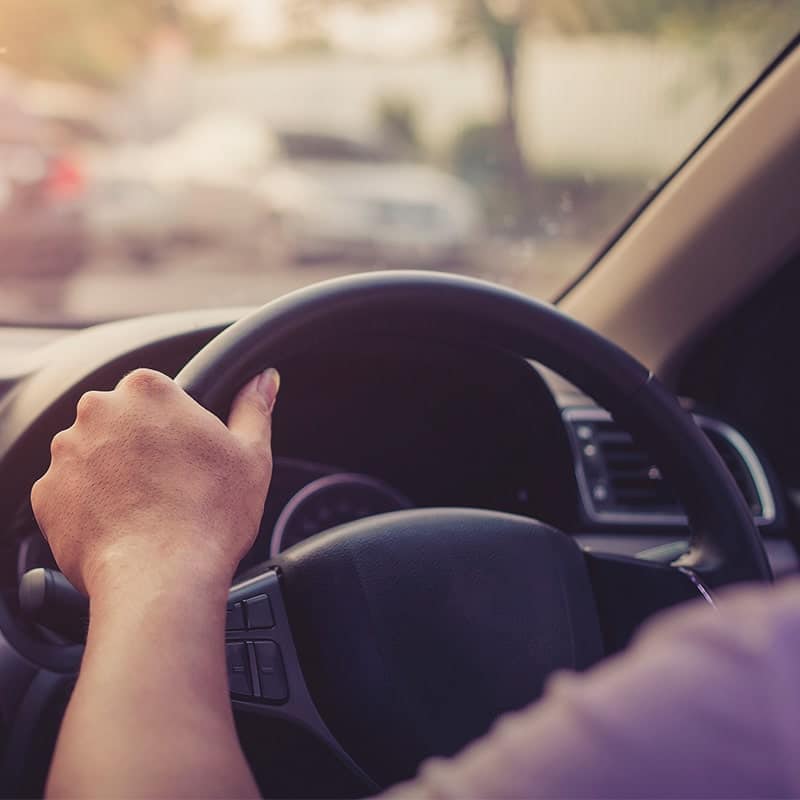
Lack of Criminal Intent
The necessary criminal intent required under the hit and run statutes is the willful failure of the driver to perform any one of the duties required by Arizona law. State v. Milligan (Ariz. 1960). Leaving the scene of an accident, or a violation of one of the driver duties, requires a willful intent, which is the same as doing something knowingly. The Arizona Legislature defined the term “wilfully” in A.R.S. § 1–215(41) as meaning, “with respect to conduct or to a circumstance described by a statute defining an offense, that a person is aware or believes that the person’s conduct is of that nature or that the circumstance exists.” The Legislature used identical language in A.R.S. § 13–105(10)(b) to define “knowingly.” An example of this defense is where a driver attempts to move his vehicle to a safe location, but upon returning to the scene, cannot find the other drivers; this is not a willful non-compliance.
Mistake of Fact
This is where the driver doesn’t realize he actually hit a car, person, or property. The noise or vibration may have an alternate explanation. For example, a driver may have reasonably concluded that he hit an animal or road debris. Or maybe, the collision was so minor or slight, it could not be heard or felt by the driver. Or maybe, a driver doesn’t realize there was damage.


Misdemeanor Compromise
While not technically a defense, a misdemeanor compromise allows a Defendant to settle with a victim outside of Court in exchange for getting a misdemeanor dismissed. Such an agreement needs to be agreed upon with the prosecutor and victim.
Necessity
A Defendant may raise a necessity defense related to safety concerns. A driver may leave an accident scene due to reasonably perceived danger. For example, after an accident, the driver may have a reasonable fear of road-rage, robbery, violence, or sexual assault. The argument is that the Driver’s decision to leave the accident was to preserve life and safety, which trumps legal obligations.
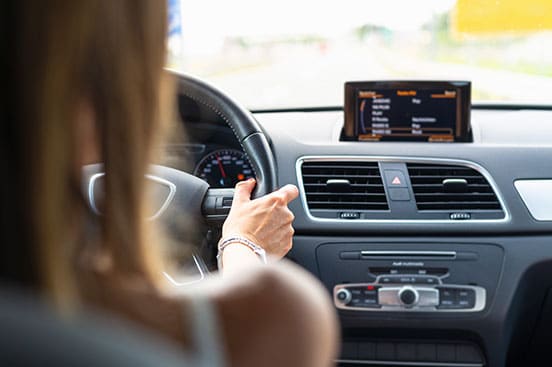
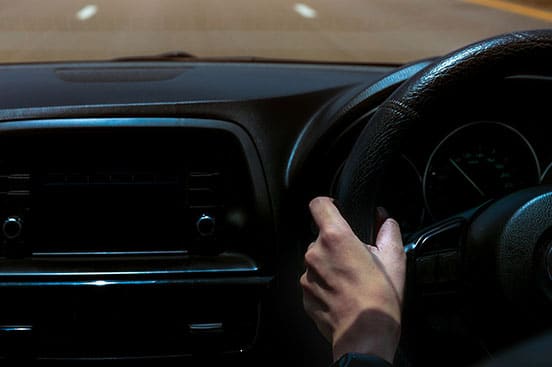
Lack of Knowledge of Injury to a Victim
In a felony hit and run, the prosecutor must prove, beyond a reasonable doubt, knowledge of personal injury to the victim. In State v. Porras, Ariz. (App.1980), the Court determined that felony liability only attaches where a defendant has actual knowledge of the personal injury or knowledge that the accident was of such a nature that one would reasonably anticipate injury.
No Serious Injury or No Injury at All
In felony prosecution, the State must prove, beyond a reasonable doubt, the type of injury that’s alleged. The injury can be challenged through cross examination, presenting independent evidence, and argument.


Constitutional Violations
Right to counsel, search and seizure, Miranda, and coerced statements can all lead to the suppression of evidence and testimony. Constitutional violations may limit the evidence presented, or in some cases, lead to a dismissal.
Testimonials
Read Reviews for Our AZ Hit And Run Defense Attorneys
Extremely helpful
“Mr. Tobin was professional and made sure I was well aware of the entire process. He helped me to get the best possible solution! Also, Mr. Tobin and his staff was extremely helpful with allowing me to complete payment plans for my court fees. Overall, I'm extremely satisfied with having chosen Mr. Tobin to represent me!” — Jocispeaks P.
I am overly pleased
“Indeed! This is as good as it gets, I called many law offices and none were as attentive as what Mr. Tobin and his office staff were. Right from the start his concern was apparent, answered all of my questions explained everything in detail, kept in constant contact with me always returning my calls and emails and leaving no stone unturned. I am overly pleased with Mr. Tobin's legal services, he goes above and beyond to get the best possible outcome for his client.” — Christina R.
Most professional and communicative lawyer
“Tim is one of the best experiences with an attorney I could ask for. Not only were we able to get a favorable judgement, but his fees are extremely reasonable and would recommend him without hesitation. He is one of the most professional and communicative lawyers I've had the pleasure meeting. 5/5 would hire again.” — Lorenzo E.
Frequently Asked Questions from Hit & Run Defendants
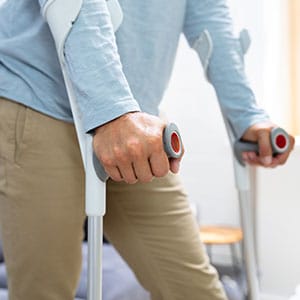
What Constitutes Injury Or Serious Injury?
The definition of injury is significant because it determines whether someone can be charged with a misdemeanor or felony. The definition of serious injury is also significant because it determines the felony level a driver faces. Under ARS 13-105, physical injury is defined as the impairment of physical condition. This includes the slightest of injury, such as slight bruising or redness of the skin. Serious injury is defined as any injury that causes reasonable risk of death, serious and permanent disfigurement, loss or protracted impairment of an organ or limb function, or serious impairment of health.
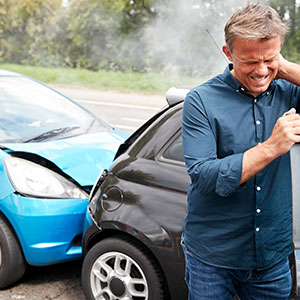
What Does It Mean To Be Involved In An Accident, So That A Driver Must Remain At The Scene, Exchange Information, And Render Reasonable Assistance To Injured Persons?
Arizona Courts apply a broad definition to what it means to be involved in an accident. Arizona Courts may consider a driver involved in the accident even if the driver didn’t actually strike a vehicle, person, or property. Thus, even when drivers are only slightly involved in an accident, they should be careful to remain at the scene and comply with statutory duties. For example, when a driver races another driver that results in an accident with a third vehicle, Arizona Courts have found this to be sufficiently involved to subject both drivers to prosecution. The Court determined that a driver is involved if the driver “actively participates in the immediate chain of events culminating in the collision.” State v. Korovkin, (Ariz. App. 2002). In another example, the Court has found a driver to be sufficiently involved when a passenger jumped out of a moving car. State v. Rodgers (Ariz. App. 1995). The Court explained that even though the vehicle was not involved in a collision, and the driver wasn’t necessarily responsible for the passenger jumping out, the driver still had to remain at that scene.
Arizona Hit And Run Defense Lawyer with Payment Plans
Professional Hit And Run Defense Attorney, Timothy Tobin
Our commitment at Tobin Law Offices is to defend our clients to the best of our ability and fight for their maximum compensation, while not overcharging them. All of our service rates are simple, affordable, and straightforward. We can guarantee that there are zero hidden fees or surcharges. The attorneys at Tobin Law Offices proudly offer reasonable payment plans for criminal defense cases, so that clients of all financial standing have the opportunity to receive excellent legal guidance. Finances should not be the reason anyone is left to deal with the repercussions of a hit and run by themselves. When you consult with our attorneys at Tobin, be sure to ask about our payment plan options.
Misdemeanor Penalties for Hit and Run / Leaving the Scene

If your case is in a City, Municipal, or Justice Court, you’re facing misdemeanor charges. Misdemeanor leaving the scene will be charged as either a class 2 or 3 misdemeanor. Although you can theoretically be charged and convicted of more than one misdemeanor, only one misdemeanor sentence may be imposed. Maximum misdemeanor penalties are dictated by the highest level misdemeanor you’re charged with.
- A class 2 misdemeanor carries up to 4 months jail, 2 years probation, and $1372.50 in fines and surcharges.
- A Class 3 Misdemeanor carries up to 30 days jail, 1 year probation, and $915.00 in fines and surcharges.
In addition to a criminal conviction on your record, additional potential penalties include: 1 year license suspension; jail incarceration fees; restitution; drug/alcohol screening and treatment; community service; classes; counseling; and, the inability to get car insurance.
Felony Penalties for Hit and Run / Leaving the Scene

Class 2
If the driver causes and leaves an accident that results in serious injury or death, the driver can be charge with a class 2 felony. With a class 2 felony, the driver faces anywhere from probation to 12.5 years in prison. If the driver has a prior felony record, the driver faces up to 35 years in prison. Additionally, if convicted, the driver’s license must be revoked for 10 years.

Class 3
If the driver didn’t cause the accident, but still left an accident scene involving serious injury or death, the driver can be charged with a class 3 felony. With a class 3 felony, the driver faces anywhere from probation to 8.75 years in prison. If the driver has a prior felony record, the driver faces up to 25 years in prison. Additionally, if convicted, the driver’s license must be revoked for 5 years.

Class 5
If the driver left an accident involving only non-serious injury, the driver can be charged with a class 5 felony. With a class 5 felony, the driver faces anywhere from probation to 2.5 years prison. If the driver has a prior felony record, the driver faces up to 7.5 years in prison. Additionally, if convicted the driver’s license must be revoked for 3 years.

- Mandatory Consecutive Sentencing: If a Defendant is convicted of another crime related to the same accident, any prison must be served consecutively. For example, if a driver is sentenced to 2.5 years for DUI and another 2.5 years for leaving the scene of the accident, the driver must serve a total of 5 years. This can give the prosecutor significant leverage in plea negotiations.
- Drug and Alcohol Treatment: If the accident involved the use of drugs or alcohol, the Court will make the Defendant complete alcohol and drug treatment.
- Additional Felony Consequences: Arizona felonies can have additional consequences such as an inability to obtain or keep professional licenses or jobs, loss of government assistance, loss of civil rights, and loss of the right to bear arms.
Call or Text Tobin Law Office at 480-447-4837 for a Free Consultation on Arizona’s Hit and Run Laws
Tobin Law Office offers free, friendly, and confidential consultations. We’re glad to give you as much information as we can to help you understand what you’re facing. If we can help you in your case, we’d be glad to.

Tobin Law Office
3100 W Ray Rd #201
Chandler, AZ 85226
1910 S Stapley Dr #221
Mesa, AZ 85204
Email: tim@tobinlawoffice.com
Website: tobinlawoffice.com












